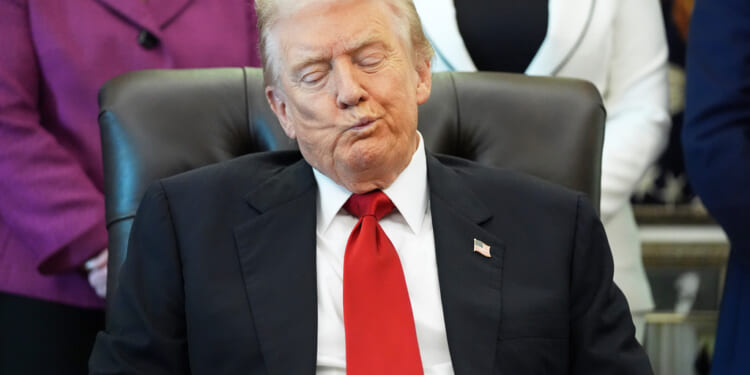In Focus delivers deeper coverage of the political, cultural, and ideological issues shaping America. Published daily by senior writers and experts, these in-depth pieces go beyond the headlines to give readers the full picture. You can find our full list of In Focus pieces here.
President Donald Trump has secured some solid victories for the GOP that will have an impact on our politics long after he is gone. But his attempts to wield federal power before he becomes a lame duck president have led to several shortsighted decisions that could similarly hamstring Republicans for years after he leaves office.
Trump has revived the demand that the Senate GOP nuke the filibuster, although he is putting much more power behind it this time. This comes as Senate Democrats have kept the government shut down for over a month, which Trump now blames on the GOP losses in the 2025 elections. On social media, Trump said, “Republicans, Terminate the Filibuster and bring back the American Dream,” adding that, “If you don’t do it, the Dems will, and you’ll never see office again!”
DEMOCRATS’ OFF-YEAR WINS REMIND US WHY THE FILIBUSTER IS NEEDED
This is the same shortsightedness that has made Democrats reel for over a decade. Democrats nuked the filibuster for most presidential nominations in November 2013, only to immediately lose control of the chamber when Republicans dominated the November 2014 elections. A few years later, that gave the Senate GOP the justification to nuke the filibuster for Supreme Court nominees, giving the nation Justices Neil Gorsuch, Brett Kavanaugh, and Amy Coney Barrett in a four-year span and flipping control of the Supreme Court for a generation. GOP leadership didn’t have to lean on its more centrist members all that much for this, because Democrats choosing to take that step in 2013 was all the justification they needed.
Republicans find themselves on the opposite side of that question now, but with a notable difference: Senate Democrats are frothing at the mouth to eliminate the filibuster. Sure, they probably will take the plunge and eliminate the filibuster next time they have the Senate majority, chasing the same short-term gains that Harry Reid did in 2013. Now, they get the best of both worlds, dragging out the shutdown in hopes that the GOP will do the dirty work for them and allow them to keep their hands clean to lean on their own centrists (such as Pennsylvania Sen. John Fetterman) on other issues instead.
Moreover, if Republicans do nuke the filibuster for good (which Democrats are begging them to do), there is no guarantee anything good comes of it. Republicans have just a 53-seat majority, and they may only have that for the next year. And, what victories the GOP would be able to force through in this hypothetical scenario would be quickly reversed by Democrats the next time they take power, which could be in the 2028 presidential election. Republicans would get maybe three years of victories that evaporate into thin air, while Democrats get exactly what they want without having to do anything.
Trump has taken this same short-term view toward tariff powers. The tariffs are bad policy, making the economy worse, while Trump insists, much like former President Joe Biden, that the economy is doing great, yet another example of short-term thinking that is going to cost the GOP its electoral edge.
But Trump’s use of tariffs is also almost certainly outside of his power, which it appears the Supreme Court will likely rule. Trump has used the “International Emergency Economic Powers Act of 1977” to argue that he can impose indefinite tariffs on other countries without the input of Congress, with the logic being that “trade deficits” are an emergency, for which tariffs are an acceptable response.
The shortsightedness was on display with the solicitor general effectively signing off on a future Democratic power grab to the Supreme Court. When Justice Neil Gorsuch asked if the Trump administration’s argument would allow a Democratic president to declare a climate emergency and impose tariffs on “gas-powered cars and auto parts,” the solicitor general arguing Trump’s case said that “it’s very likely that that could be done.” The Trump administration, chasing short-term “benefits” from tariffs that are hampering the economy and souring voters on the GOP, would make an argument that grants legitimacy for a future Democratic president to bypass Congress for “climate emergencies.”
The fact that voters are souring on the GOP now bodes ill for Trump’s other big venture: Congressional redistricting. After Texas chose to go forward with redistricting, Trump and his team decided to threaten electoral consequences for Republicans who do not gerrymander their maps to benefit House Republicans. That includes threatening state legislators in Indiana and even New Hampshire Gov. Kelly Ayotte, who beat her Democratic opponent by more than nine points on the same ballot Trump lost to Kamala Harris by three points.
Gerrymandering is not an exact science, though, and the risk Republicans run is stretching GOP voters too thin across too many districts and having that backfire in a potential wave year. Texas Republicans would be the most familiar with this phenomenon, as it happened to them in the 2018 “blue wave.” Trump could successfully pressure every GOP-controlled state into redrawing maps to what appears to be beneficial to Republicans, just to result in even more Democratic victories as voters turn on him as they lose confidence in his economy. (Do you see how this all flows together?)
You can see that Trump only views politics through a short-term lens in how he talks about his own party. After Republicans lost the major races in Virginia and New Jersey and the minor races elsewhere during the 2025 elections, Trump took to social media to let Republicans know that they can’t win without him. “‘TRUMP WASN’T ON THE BALLOT, AND SHUTDOWN, WERE THE TWO REASONS THAT REPUBLICANS LOST ELECTIONS TONIGHT,’ according to Pollsters,” Trump said on social media. (Yes, in all caps).
We can debate whether that is true or not. Trump won in 2016, despite underperforming the 2012 GOP nominee Mitt Romney in several swing states, because he was running against the heavily disliked Hillary Clinton. In 2020, Trump lost to Joe Biden. Trump’s grand crowning victory was in 2024, but much of that was due to him running against one of the least impressive candidates in modern history, Kamala Harris, who was the vice president in one of the least popular presidential administrations of all time.
TRUMP’S FILIBUSTER NUKE WOULD HAND DEMOCRATS THE KEYS TO REMAKE AMERICA
But let’s take Trump’s talk as true, and that Republicans cannot win without him on the ballot. Barring a constitutional amendment that will never be passed, Trump will never be on the presidential ballot again. Trump has shaped the party for the past decade and, according to him, the result is a party that can’t win without him. Trump exerts pressure on the candidates and campaigns, staffs the Republican National Committee, and controls the central messaging of the party, and he has built a short-term operation that (again, according to him) will fall apart the moment he is gone. (Or already has, because he won’t ever be on the ballot as a presidential candidate again).
If that is the case, Republicans would be doomed no matter what happens in Trump’s final three years. Regardless, it perfectly illustrates Trump’s short-term thinking on politics, making everything about him and not worrying about whether or not a Democrat comes along after him and undoes much of his legacy. Trump’s presidencies have been important for a variety of reasons, but his recklessness and rejection of delayed gratification could put the GOP in a hole as soon as next year’s elections.

















